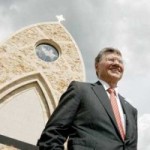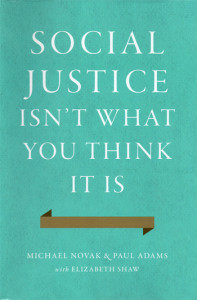Delivered by Michael Novak at the Ave Maria Law School Gala and published by The Catholic Thing on Saturday, December 6 2014
Editor’s Note: These remarks were presented by the author at the Gala Dinner for the Ave Maria Law School in Naples Florida honoring philanthropist Tom Monaghan on December 5. – Robert Royal
In France, when people want to get something done they turn to the State; in Great Britain, to the aristocracy. In the United States, we turn to each other.
To put up schoolhouses all across this land, we used to gather for square dances and auctions (see Oklahoma!), for clambakes and raffles, for bake sales, quilt sales, and (at least we Catholics) – bingo. Tonight we take part in one of the oldest and most solemn of all American public liturgies: A fundraiser! Better than relying on the State is to build what we cherish most by ourselves.
I am deeply, deeply honored to be here to contribute to the Thomas Monaghan Scholarship Fund and the annual auction. For years I used to praise Tom as “my favorite billionaire saint.” Then Ave Maria School of Law – and the University even more – bit into Tom pretty hard. Now I praise him as my favorite “former billionaire saint.”
Why does Mr. Monaghan give so much? He knows the fragility of freedom and of faith. Freedom can be lost in a single generation. Only one generation has to give up on America’s founding laws, switch off the lights, and walk out the door. And then it’s gone, this noble experiment.
I think Tom asked himself: Does this century mark America’s last? Is this nation a short-term meteor that has blazed across the heavens, and is now exhausted? Or rather, is our present fog a transient time of trial, those hours cold and dark, bombs bursting in air, ramparts red-gleaming? Are we nearing our end, or at a new beginning?
Tom Monaghan, who began life as an orphan, and was made a man by the U.S. Marines, knew instantly what he would choose. He chose to make these years a new beginning – for his faith and for his country. And he started with the law. As Blackstone put it, right at the top of his book, the Law of Moses became through Jesus Christ (taking it to the Gentiles) the font and spring of constitutional government among all peoples: “Upon these two foundations, the law of nature and the law of revelation, depend all human laws. . . .[N]o human laws should be suffered to contradict these.”
The founders of the United States held that there can be no republic without liberty, and no liberty without morality; and – for most people – no morality without God. Modern lawyers may no longer hold this. But our founders did. George Washington did:
In vain would that man claim the tribute of patriotism, who should labor to subvert these great pillars of human happiness, these firmest props of the duties of men and citizens [he spoke of religion and morality]. . . . Let it simply be asked: Where is the security for property, for reputation, for life, if the sense of religious obligation desert the oaths?
And let us with caution indulge the supposition that morality can be maintained without religion. Whatever may be conceded to the influence of refined education on minds of peculiar structure, reason and experience both forbid us to expect that national morality can prevail in exclusion of religious principle.
Given the horrors of the century just passed, who would wish to bet our republic’s continuance on a people who have no inner policemen, no inner conscience?
Where nearly all citizens live by inner policemen, official police forces can be small. Among peoples without inner policemen, no number of policemen on the street will suffice.
Mr. Monaghan expected original intellectual contributions from the Ave Maria School of Law. Did not Tocqueville hint that Catholics would one day become the best articulators of the inner principles of American law? Mr. Monaghan gave us a command: Advance the intellectual inheritance that Catholic faith brings to law. Some of that inheritance includes:

A global institution. The first global institution in human history was the Catholic Church. “Go teach all nations.” Not just one people, nor race, nor tribe, but all humans everywhere. “Catholic” is a more ancient term that “global.”
- International law. Outside the United Nations building in New York City stands the statue of Francisco de Vitoria, O.P., founder of modern international law.
- Universal human rights. As Harvard’s Mary Ann Glendon has shown in her splendid study of the Universal Declaration of Human Rights, both Catholic and Jewish thinkers led the way in inventing a new universal language for human rights, including the family and other institutions more vital than the State.
- Natural rights. The earliest writings about natural rights in the American hemisphere did not spring from Hobbes, Locke, Hooker or Jefferson, Madison, or Marshall, but rather from Bartolomé de las Casas (1484-1566). Some men are by nature slavish and deserve to be slaves, Aristotle had written. As brilliantly told in Lewis Hanke’s Aristotle and the American Indians, Friar Bartolomé could no longer accept that.
- How even inequality serves equality. Tocqueville marveled at the delicious irony that Catholic societies even under feudalism, aristocracy, and inequalities of status, dramatized the equality of all humans more vividly than its rivals. The king knelt at the same communion rail as his serfs. The Almighty and Infinite God was not impressed by the wealth or station of any human being, no matter how great in their own eyes. Before God, all humans are as dust. Or embraced warmly and equally as daughters and sons, through the sacrifice of Christ.
- The primacy of civil society. Closer to our own time, Jacques Maritain’s Man and the State clarified the primacy of civil society over the state in new language, which had earlier proved crucial in persuading some nations to sign the Universal Declaration of Human Rights, because it protected primary, smaller institutions from the State.
- The first law of democracy: association. Tocqueville wrote that the first law of democracy is the principle of association. He noted that the Catholic traditions of the Middle Ages went beyond the mere individual, through a multitude of sodalities, fraternities, guilds, and associations. Of necessity, this habit of association was reborn in America, where society was formed small-scale first: from associations of neighbors helping each other, to villages, then to townships, then to states, and only after 150 years to a Union of States, the United Americans aren’t great as individuals; most of our lives have been spent in building communities, from the ground up.
- From individual to person. Catholic thought also gave rise to the crucial distinction between the individual and the person. This particular yellow pencil [pulls from pocket], our family dog, “Hollow,” the beech tree in our back yard – those are individuals. Persons have far more capacities and responsibilities than individuals, and the higher dignity of choosing their own destiny. Regarding their past, persons can reflect on it, and choose to change their ways. Regarding their future, persons face a dizzying multitude of open paths, and must by themselves choose the one dearest to them. We do not gain dignity from being individuals, but from being persons capable of reflection and choice. Animals do not build republics. Only humans do, from reflection and choice.
- Where “liberty, fraternity, and equality” come from. The German atheist Jürgen Habermas had the honesty and guts to admit publicly (in debate with Cardinal Ratzinger), that these battle-cries of the Enlightenment, “Liberty! Fraternity! Equality!” derive from Jewish and Christian principles. No pagan thinker held to them. Certainly not to fraternity, and not to the other two, either.
- What is liberty? Liberty is not the freedom to act as one pleases – that is the freedom only of animals. Human liberty is the freedom to act as one ought to act. Animals know no ought. Human consciences do.
- A self-evident DUTY grounds the right to religious liberty. As Jefferson and Madison both demonstrate, it is self-evident that a duty of gratitude is owed by any conscious creature to her Creator. Both Madison and Jefferson trace religious liberty to this primordial duty. The duty of a creature to her Creator is so deep no one else dares to interfere with it. The Second Vatican Council’s Decree on Religious Liberty also grounds religious liberty in this duty.
To present a fully developed Christian philosophy of law is the impulsion given to Ave Maria School of Law by Tom Monaghan. Now is the time, this is the place, to push forward that great work, as no other law school has done before. The duty to achieve greatness has been thrust upon this School. And just at a time when our floundering nation needs it desperately. And the Catholic faith, as well.
I want to conclude tonight with the story of Dr. Joseph Warren, the physician who delivered the babies of Abigail Adams and many other mothers. Dr. Warren stood with the Minutemen at Lexington, even took a bullet through his hair. Two months later, just commissioned a Major General in the Continental Army, he learned that 1,500 patriots had crept up Bunker Hill at night and silently erected earthen walls.
At daylight, battalions of Redcoats put all of Charlestown to the torch, and tongues of flame from 500 houses, businesses, and churches leapt into the sky. Breathless, Abigail Adams watched from a distant hillside, and heard the warships thunder shot and shell on Bunker Hill for five long hours. As they did so, Doctor Warren – now Major General Warren – was galloping to Boston and when he arrived took a position in the lowest ranks on Bunker Hill.
The American irregulars proved their discipline that day. Twice they broke the forward march of 3,500 British troops, with fire so withering they blew away as many as 70 to 90 percent of the foremost companies of Redcoats, who lost that day more than 1,000 dead. Then the ammunition of the Americans ran out.
While the bulk of the Continental Army retreated, the last units stayed in their trenches to hold off the British hand-to-hand. That is where Major General Joseph Warren was last seen fighting, as a close-range bullet felled him. The British officers had him decapitated and bore his head to General Gage.
As Tom Monaghan has recognized, freedom is always the most precarious regime. Even a single generation can throw it all away. Every generation must decide. And what holds for America holds also for the Catholic faith. When the Lord returns, will he find on earth even a single person who is still faithful to Him?
Like Tom Monaghan, Joseph Warren told the men of Massachusetts:
Our country is in danger now, but not to be despaired of. On you depend the fortunes of America. You are to decide the important questions upon which rest the happiness and the liberty of millions not yet born. Act worthy of yourselves.
Let us go now, with generous hearts, into the auction – to support the high mission of this blessed School. And in honor of – Thomas Monaghan.






